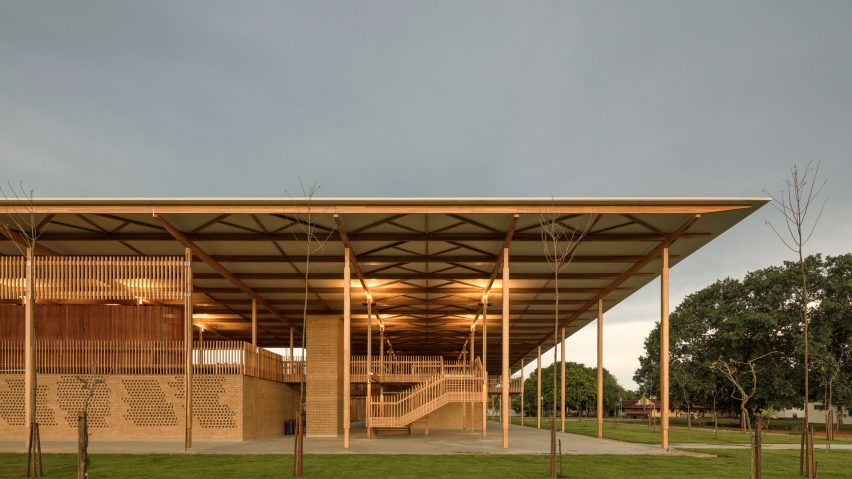A school boarding facility designed by architecture studios Aleph Zero and Rosenbaum, said to be "reinventing Brazilian vernacular", has won this year's RIBA International Prize.
Dezeen is media partner for the RIBA International Prize 2018, which pays tribute to the most impressive and innovative buildings from all around the world.
Children Village, a 25,000-square-metre complex on the edge of a rainforest in northern Brazil, becomes the second winner of the prize.
The project provides boarding facilitates for up to 540 children, many of whom come from remote parts of the country. It follows the vision of its designers to use architecture "as a tool for social transformation".
The architects worked closely with students when developing their design, to ensure that the end result provides them with "a home away from home".
"Children Village provides an exceptional environment designed to improve the lives and wellbeing of the school's children, and illustrates the immeasurable value of good educational design," said RIBA president Ben Derbyshire.
Aleph Zero and Rosenbaum, both based in Brazil, completed Children Village in 2016. It serves the Canuanã School, one of 40 education facilities run and funded by the Bradesco Foundation.
The facility comprises two identical complexes, providing separate areas for both boys and girls. Each group of buildings is arranged around three shaded courtyards, with dormitories on the ground floors and communal spaces upstairs.
The structures are built from earth blocks, making the buildings both cost-efficient and sustainable. Other details include canopy roofs framed by cross-laminated timber, which provide relief from the tropical climate.
The project was selected by a panel of judges led by architect Elizabeth Diller, co-founder of Diller Scofidio + Renfro. They selected the project ahead of the three others on the shortlist after seeing them all in person.
The architects said they "thrilled" and "deeply honoured" by the accolade.
"This award strengthens our understanding of architecture as a tool for social transformation, a tool that transcends construction and creates a deep connection between young people and their ancestors and knowledge," said Marcelo Rosenbaum and Adriana Benguela, directors of Rosenbaum.
"The space facilitates the interaction between public and private, and socialising between the collective, nature and the individual, reconnecting children and young people to their origins and with their surrounding ecosystem," they added.
Gustavo Utrabo and Pedro Duschenes, directors of Aleph Zero, said they have found it a joy "to see the children making the building their own and adapting the space to fit their needs".
"Kids will make their own play and have imagination to burn," they continued. "We wanted to be prescriptive without being overbearing, to be supportive without being patronising, and to encourage growth and development without cosseting it."
The RIBA International Prize launched at the end of 2015, replacing the former Lubetkin Prize. It is open to buildings of any size, scope and budget, in any country and by any qualified architect, as long as they have been completed in the last three years.
The first winner was Grafton Architects, for the Universidad de Ingeniería y Tecnología (UTEC) in Peru.
The other projects vying for the prize this year were Toho Gakuen School of Music by Nikken Sekkei, Central European University by O'Donnell + Tuomey and Il Bosco Verticale by Boeri Studio.
Photography is by Leonardo Finotti.

